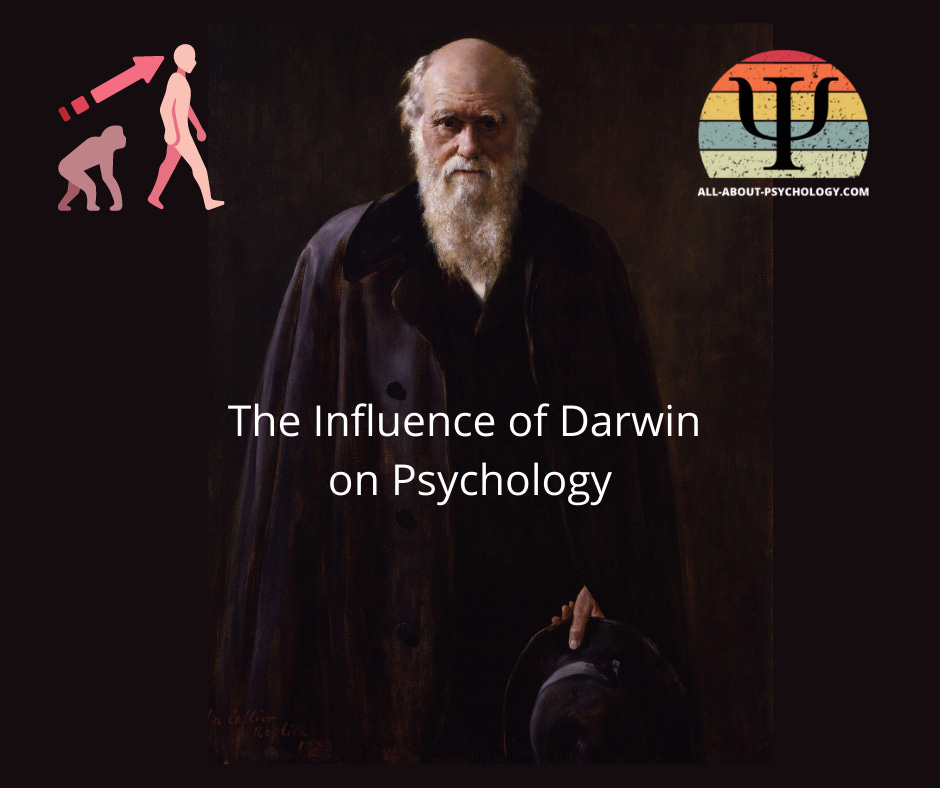All About Psychology Newsletter
What is Déjà vu? The Three Christs of Ypsilanti. The Influence of Darwin on Psychology. What Does Sensory Deprivation Do to a Person?
A very warm welcome to the latest edition of the All About Psychology newsletter—the official newsletter of All-About-Psychology.com, a website providing comprehensive information and resources for psychology students and educators since 2008.
What is Déjà vu?
Ever had that eerie sense of having lived through a moment before, even though you know it’s impossible? That unsettling sensation, known as déjà vu, has puzzled thinkers for centuries, and now, psychologists are uncovering fascinating insights into its mysteries.
This concise and engaging article by Anne Cleary, Professor of Cognitive Psychology at Colorado State University explores the history of déjà vu research, from its paranormal origins to its arrival in mainstream science. Discover how groundbreaking experiments, including virtual reality studies, have begun to unravel its secrets—like how the layout of a place might unconsciously resemble a forgotten memory, sparking that strange feeling of familiarity.
An interesting read for anyone curious about the quirks of human memory and how our brains perceive reality.
The Three Christs of Ypsilanti
Few books address the intricacies of human belief and identity as compellingly as The Three Christs of Ypsilanti by Milton Rokeach. This groundbreaking publication provided a rare and unsettling glimpse into an extraordinary psychological experiment conducted in the late 1950s. At the heart of the study were three men—Joseph, Clyde, and Leon—who were all convinced that they were Jesus Christ. By bringing them together in a controlled environment, Rokeach sought to unravel the complexities of delusional belief systems and explore the resilience of the human mind in maintaining a sense of self, even when challenged with undeniable contradictions.
A Captivating Psychological Study
At its core, the book raises profound questions about belief, identity, and the very nature of reality. Why do some beliefs remain steadfast in the face of conflicting evidence? How does the mind protect itself from cognitive dissonance? Through his meticulous observations, Rokeach revealed the fascinating ways these three men navigated their interactions—whether through denial, rationalization, or confrontation—and demonstrated how deeply ingrained beliefs serve as coping mechanisms for trauma, alienation, and existential insecurity.
Ethics and the Human Experience
While the book offers fascinating insights into delusional systems, it is also an ethical minefield. Critics have long questioned the methods employed by Rokeach, particularly the psychological strain placed on the participants as their identities were challenged. This makes The Three Christs of Ypsilanti not only a grippingly raw study of mental illness but also a sobering reflection on the responsibilities of psychological researchers toward their subjects.
Why Psychology Students Should Read This Book
The Three Christs of Ypsilanti is an unprecedented case study in the resilience of belief systems, the dynamics of delusion, and the interaction of identity and social context. It provides invaluable lessons in the complexity of mental illness, the interplay of psychological and environmental factors, and the ethical challenges inherent in psychological research.
Key Themes and Insights
The Nature of Belief Systems: The book showcases the remarkable persistence of deeply held beliefs, even when contradicted by logic or evidence.
Identity and Delusion: It explores the psychological functions of delusions in constructing and maintaining a sense of self.
Ethical Considerations: The study prompts critical reflection on the ethical boundaries of psychological research and the impact of experimental design on participants.
A Lasting Impact
The Three Christs of Ypsilanti continues to fascinate those interested in the psychology of belief, the human experience of delusion, and the moral considerations of studying vulnerable populations. For anyone curious about the depths of human psychology, this book is an unforgettable examination of the fragility and resilience of the mind.
In 2017, the film Three Christs based on Rokeach's book was released starring Richard Gere, Peter Dinklage, Walton Goggins and Bradley Whitford.
Psychology Classic
Step into the fascinating intersection of evolutionary theory and psychology with James Rowland Angell's 1909 classic article on Darwin’s groundbreaking influence on mental evolution. Originally published in Psychological Review, this article delves into the transformative ideas that Charles Darwin brought to the study of the mind, exploring how his revolutionary theories inspired the emergence of functional and genetic psychology.
From the evolution of instinct and intelligence to the profound continuity Darwin proposed between animal and human minds, Angell examines the key psychological insights that flowed from Darwin’s work. The piece also highlights the enduring debates sparked by Darwin's theories, such as the nature of emotions, the origins of conscience, and the controversial parallels between human and animal cognition.
Through Angell’s analysis, readers gain a deeper understanding of how Darwin’s ideas transcended biology to reshape the study of psychology, emphasizing growth, adaptation, and the influence of the environment on mental processes. You can read Angell's article in full for free via the following link.
The Influence of Darwin on Psychology
Stay in the know! The All About Psychology newsletter is your go-to source for all things psychology. Subscribe today and instantly receive my bestselling Psychology Student Guide right in your inbox.
Upgrade to a paid subscription and also get the eBook version of my latest book Psychology Q & A: Great Answers to Fascinating Psychology Questions, as well as regular psychology book giveaways and other exclusive benefits. As a paid subscriber, you will also be:
Ensuring that psychology students and educators continue to have completely free access to the most important and influential journal articles ever published in the history of psychology.
Ensuring that psychology students and educators continue to hear from world renowned psychologists and experts.
Ensuring that free quality content and resources for psychology students and educators continue to be created on a regular basis.
Psychology Q&A
Question submitted to the All About Psychology Q&A page, followed by a submitted answer.
What are the psychological after effects of 96 hours light, sound, and human contact deprivation?
Sensory deprivation, particularly when it involves the absence of light, sound, and human contact for an extended period like 96 hours, can have profound psychological effects on individuals. These effects can vary depending on factors such as individual susceptibility, pre-existing psychological conditions, and personal coping mechanisms. Here are 10 potential psychological after effects of such deprivation:
1. Hallucinations and Distorted Perceptions: Prolonged sensory deprivation can lead to sensory distortions and hallucinations. The absence of external stimuli can cause the brain to generate its own sensory experiences, leading to visual, auditory, or even tactile hallucinations. These experiences can be vivid and unsettling.
2. Cognitive Disturbances: Individuals subjected to sensory deprivation may experience cognitive disturbances such as difficulties in concentration, memory lapses, and impaired problem-solving abilities. The lack of sensory input that the brain relies on for cognitive processing can disrupt normal cognitive functioning.
3. Emotional Instability: Isolation from external sensory experiences and human interaction can contribute to emotional instability. Feelings of anxiety, depression, irritability, and even emotional numbness can emerge as a result of the prolonged sensory deprivation.
4. Anxiety and Panic: The absence of external stimuli can lead to heightened awareness of internal bodily sensations, potentially inducing anxiety or even panic attacks. Individuals might become hyper-focused on their physiological processes, leading to increased heart rate, rapid breathing, and other anxiety-related symptoms.
5. Altered Time Perception: Sensory deprivation can distort individuals' perception of time. Without external cues like daylight or auditory cues, individuals might struggle to accurately track time, leading to feelings of timelessness or disorientation.
6. Changes in Sleep Patterns: Deprivation of natural light and sound cues can disrupt circadian rhythms and sleep patterns. Individuals might experience difficulties falling asleep, staying asleep, or experiencing restorative sleep.
7. Self-Reflection and Introspection: In the absence of external distractions, some individuals might engage in deep self-reflection and introspection. This can lead to profound insights but might also exacerbate feelings of loneliness or existential distress.
8. Decreased Social Skills: Extended isolation from human contact can lead to a decline in social skills and an increased sense of social awkwardness. Interpersonal interactions might become challenging after such deprivation.
9. Sensory Overload After Release: When individuals are reintroduced to sensory stimuli after prolonged deprivation, they might experience sensory overload. Ordinary sensations might feel overwhelming, leading to anxiety or discomfort.
10. Coping Mechanisms: Different individuals respond differently to sensory deprivation. Some might develop coping mechanisms such as daydreaming, fantasy, or creating imaginary scenarios to counteract the lack of external stimuli.
It's important to note that while sensory deprivation research has provided valuable insights into the potential effects of extreme isolation, conducting such experiments raises ethical concerns due to the potential harm it can cause. Researchers must prioritize the well-being and mental health of participants and adhere to ethical guidelines when studying sensory deprivation.
Ultimately, the psychological after effects of 96 hours of light, sound, and human contact deprivation can range from sensory distortions and emotional instability to altered cognitive functioning and disrupted sleep patterns. These effects underscore the profound impact that sensory input and social interaction have on human psychological well-being.
Psychology Q & A is open to everyone and is designed as a space for those with an interest in psychology to both give and receive help. So, if you have a psychology-related question, feel free to ask! And if you believe you can answer any of the questions posted, I encourage you to share your insights. Please note that any content generated by psychology Q & A is provided for informational purposes only. It does not signify that I endorse the material provided or the views expressed. None of the information within psychology Q & A should be considered a substitute for professional psychological, psychiatric or medical advice, diagnosis, or treatment.
Visit the All About Psychology Amazon Store to check out an awesome collection of psychology books, gifts and T-shirts. Sales help support All-About-Psychology.Com, a website providing free and comprehensive information and resources for psychology students and educators since 2008.
For more psychology information and resources, visit All-About-Psychology.Com and connect with me via the All About Psychology social media channels:









